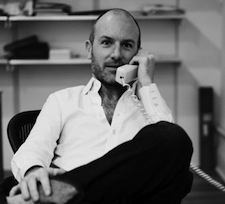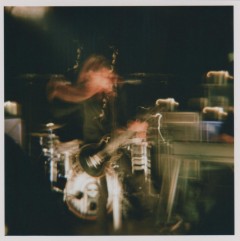Editorials Michael Signorelli — January 29, 2013 12:47 — 0 Comments
The Monarch Drinks With Lorin Stein
You may have read one of the many profiles of Lorin Stein since he became the editor of the Paris Review in April 2010. He has been described as “whippet-thin,†“aquiline,†“one of the most visible characters on the young literary scene.†And while literary media has enjoyed tracking his rise to prominence, he’s aimed to bring fiction and poetry, the discovery of new literary talent, back to the fore of the Paris Review’s mission. He’s done so by blending the roles of figurehead and steward, promoting the journal’s convivial reputation, and minding the parameters set by the journal’s first and longtime editor-in-chief, George Plimpton.
I have met Lorin Stein a number of times, almost always at a Paris Review party, and almost always only for a few fleeting moments, before the tidal grip of the gathering pulls Lorin to some other part of the room, often to greet another young writer or colleague. He’s the host that’s happy to see everyone; and he’s hard to keep in one place.
On the day of our meeting, Lorin invites me to his apartment on 9th Street in Greenwich Village, just north of Washington Square Park. We’ll have a drink before heading out to dinner. I arrive on his stoop a few minutes after seven. He buzzes me in and meets me on the stairs. In his kitchen, he mentions that he has an early board meeting the next morning so should take it easy tonight. He makes me a martini. We move from the kitchen, passing two full bookshelves, to the living room. The ceilings are high. There is a fireplace, in front of which are two leather wing-backed chairs. Lorin later tells me they are on extended loan from Jonathan Galassi, publisher of Farrar Straus & Giroux. Another two full bookshelves face each other from opposite walls. Framed art hangs at tasteful intervals. Bob Dylan’s Blood on the Tracks plays on a phonograph. The décor is almost Spartan but not without warmth. The furnishings are leanly yet impeccably assembled, much like Lorin himself, who takes a seat at the end of a wooden table near the kitchen’s entrance. I am envious of the single man who lives here. I sit. Lorin drinks rye and offers me a Lucky strike and a light.
The conversation barely has time to warm up before we are trying to figure it all out. Aside from a few brief turns through the topics of family, politics, and publishing, we settle into a consideration of the religious impulse. Lorin pursues the idea as if it’s been weighing on his mind. And maybe it has. He recently wrote an appreciation of Psalm 139, which he called, “the most beautiful of the psalms in the King James version.†The piece appeared on the Paris Review Daily, an active aspect of the journal’s revamped online presence. Lorin stalks the subject with measured steps of mind, pausing often, speaking only when the static of his thought achieves sufficient charge. He talks of John Woolman, the man who made abolition a Quaker cause. He talks of Charles Lamb, accountant, would-be poet, and friend of Coleridge, who popularized Woolman’s Journals among the early Romantics. He conjures his subject with such appreciation that his eyes appear to well. Our conversation takes a breath. We prepare to leave. I finish my topped-off martini. Lorin shakes out another pack of cigarettes from a carton and dons a warm-looking ushanka.
Only a few blocks north from Lorin’s apartment, on 13th Street, is Café Loup. On its awning, a hand casts the shadow of a wolf in profile. Upon entering, Lloyd, the owner and sometime host, greets us and thanks Lorin for the plug in Dwight Garner’s “Tour of Literary Manhattan,†which had appeared in the New York Times. Garner described Café Loup as a “genteel but unpretentious West Village bistro.†He mentioned regularly seeing writers such as Susan Sontag and Paul Auster. A few years ago, I had my own encounter when an individual nearly pushed me over to more effectively razz the bartender. The voice that poured over my shoulder was luxuriantly deep and British. I turned, annoyed, to see Christopher Hitchens laughing on his way to the exit. Today, if you go into the men’s bathroom, you’ll see written on the wall, “Hitchens is dead. Long live Hitchens.†You’ll also see, “Hegel is an asshole.â€
Lorin first came to Café Loup when he was thirteen or fourteen years old and his family visited from Washington. They would go with a friend of his mother’s. “I liked it immediately,†he recalls, “I think partly because it reminded me of the restaurant that my mother used to manage. This was a place called Herb’s, near Dupont Circle, in the basement of what was then the (confusingly named) Georgetown Hotel. In the afternoons, my sister and I would do our homework at the bar, drinking Shirley Temples, waiting for our mother to get off work.†The bar was generally empty as this time, he assures me. “Something about Café Loup has always reminded me of Herb’s – something about the red cabbage, the white walls and the artwork, the clientele.â€
On the way to our seats, we run into a mutual acquaintance, a novelist, who happens to be on a date with a young scientist from the Museum of Natural History. Naturally, we discuss the spelling and behavior of coelacanths. After taking good measure of this amazing fish, Lorin and I take our seats. We order wine. Lorin tastes and does not look convinced. I am asked to confirm the verdict. I apply the wine-tasting techniques I learned at an hour-long seminar I attended eight years ago in college. The wine is subtly off, the taste takes a chemical turn on its way up the sniffer. I would normally grumble my way to a comfortable inebriation, but tonight the living is fine, so back it goes.
The waiter and bartender are gracious in this moment. I salute them. Lorin orders a salad. I order the duck. A new bottle arrives. We eat. Lorin is fascinated by the inner-workings of American fraternities. Without betraying any oaths, I relate what I can. Then he’s equally piqued by the mechanics of fly-fishing. This I more freely describe. Lorin is an indulgent listener. I persist with my fishing talk, and Lorin seizes on an image, maybe something to do with a cast flung and unfurling over open water, that reminds him of two lines from Psalm 139, “If I take the wings of the morning, / and dwell in the uttermost parts of the sea.†He repeats. His eyes well. And we finish our food.
The answer isn't poetry, but rather language
- Richard Kenney




